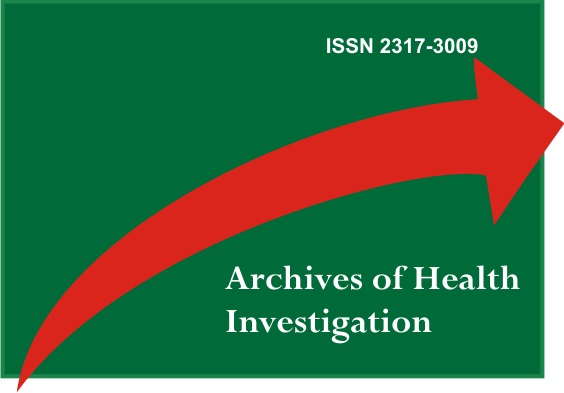Health education strategy for young people: report of experience in student group
DOI:
https://doi.org/10.21270/archi.v10i5.5244Keywords:
Health Promotion, Health Education, Physical Therapy SpecialtyAbstract
The work aims to report the experience of a health education action aimed at young people, participating in a preparatory course for the National High School Exam. The action was developed in the course itself, by undergraduate students in physiotherapy, participants in an extension project. For this, the inverted classroom methodology with a theoretical-practical approach to action was used. Before it happened, permanent health education was used for undergraduate students, as a way to acquire knowledge on the subject to be addressed. The topics covered were suicide prevention, perineum health awareness, cardiovascular disease prevention, bowel cancer prevention. It was possible to observe that the experience promoted a means of empowerment and awareness for young people, since they showed excitement, as well as an experience of health education, teaching and humanization for undergraduates.
Downloads
References
Malta DC, Neto OLM, Silva MMA, Rocha D, Castro AM, Reis AAC, Akerman M. National Health Promotion Policy (PNPS): chapters of a journey still under construction. Ciênc Saúde Coletiva. 2016;21(6):1683-94.
Malta DC, Reis AAC, Jaime PC, Neto OLM, Silva MMA, Akerman M. Ciênc Saúde Coletiva. 2018; 23(6):1799-809.
Gonçalves CB, Pinto ICM, França T, Teixeira CM. The resumption of the implementation process of the National Permanent Health Education Policy in Brazil). Saúde Debate. 2019;43(esp.1):12-23.
Almeida ER, Moutinho CB, Leite MTS.Family health nurses’ teaching practice in the health education development. Interface. 2016; 20(57):389-401.
Santili PGJ, Tonhom SFR, Marin MJS. Educação em saúde: algumas reflexões sobre sua implementação pelas equipes da Estratégia Saúde da Família. Rev Bras Promoç Saúde. 2016;29(Supl):102-10.
Viero VDSF, Farias JMD, Ferraz F, Simões PW, Martins JA, Ceretta LB. Educação em saúde com adolescentes: análise da aquisição de conhecimentos sobre temas de saúde. Esc Anna Nery. 2015;19(3):484-90.
Sousa BSA, Almeida CAPL, Carvalho HEF, Gonçalves LA, Cruz JN. A enfermagem no cuidado da criança autista no ambiente escolar. Saúde e Pesqui. 2018;11(1):163-70.
França T, Medeiros KR, Belisario SA, Garcia AC, Pinto ICM, Castro JL et al. Continuous Health Education policy in Brazil: the contribution of the Teaching-Service Integration Standing Committees. Ciênc Saúde Coletiva. 2017;22(6):1817-28.
Shackleton N, Jamal F, Viner RM, Dickson K, Patton G, Bonell C. School-Based Interventions Going Beyond Health Education to Promote Adolescent Health: Systematic Review of Reviews. J Adolesc Health. 2016;58(4):382-96.
Batra BS, Collins H. Effect of health education on adolescent girls’ knowledge about family life education. Int J Health Care Edu Med Inform. 2019;6(1):3-5
Monteiro RJS, Oliveira MPCA, Belian RB, Lima LS, Santiago ME, Gontijo DT. DECIDIX: meeting of the Paulo Freire pedagogy with the serious games in the field of health education with adolescentes. Ciênc Saúde Coletiva. 2018;23(9):2951-962.
Koudenburg N, Jetten J, Dingle GA. Personal autonomy in group-basead interventions. Eur J Soc Psychol. 2017;47(5):653-60.
Alves NS, Portela ERM, Gonçalves FS, Guimarães TS, Alencar AJF, Mendes ES et al. Perspectivas sobre o trabalho do fisioterapeuta na atenção básica: uma revisão integrativa. Rev CPAQV. 2020;12(1):1-8.
Cotta RMM, Ferreira ES. Mapas conceituais e aula invertida: benefícios para o processo de ensino e aprendizagem sobre as políticas de saúde. RIEU. 2019;2(1):22-32.
Almeida ER, Moutinho CB, Leite MTS. Family health nurses’ teaching practice in the health education development. Interface. 2016;20 (57):389-401.
Maniva SJCF, Carvalho ZMF, Gome RKG, Carvalho REFL, Ximenes LB, Freitas CHA. Educational technologies for health education on stroke: an integrative review. Rev Bras Enferm. 2018;71(4):1724-31.
Assenheimer A, Moura D, Brum ZP, Fontana RT, Guimarães CA, Soares NV, Lucca JCP. Comunicação interpessoal enquanto fator para a humanização do cuidado. RICSB. 2018;2(2):1-9.
Bolleia VR, Cesaretti MLR. Sala de aula invertida na educação para as profissões de saúde: conceitos essenciais para a prática. Rev Eletr Farm. 2017;14(1):39-48.
Carvalho, VL, Oliveira, ALC. Interface entre a saúde coletiva e a fisioterapia: avaliação da política educacional. Fisioter Bras. 2016; 17(4):428-34.


